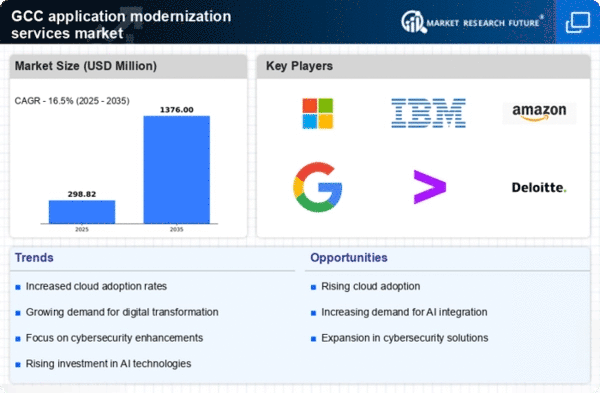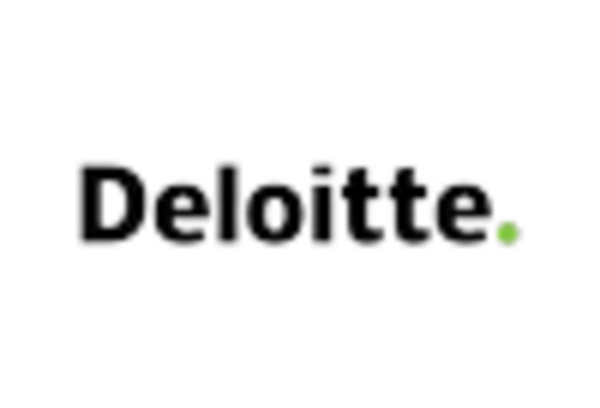Increased Focus on Cost Efficiency
Cost efficiency remains a pivotal driver in the application modernization-services market, particularly in the GCC, where organizations are under pressure to optimize their operational expenditures. By modernizing applications, companies can reduce maintenance costs associated with outdated systems and improve resource allocation. It is estimated that organizations can save up to 30% in operational costs by transitioning to modern platforms. This financial incentive encourages businesses to invest in application modernization services, as they seek to achieve better ROI and enhance their competitive edge. The emphasis on cost efficiency is likely to continue shaping the strategies of enterprises in the GCC, further propelling the growth of the application modernization-services market.
Regulatory Compliance and Governance
The application modernization-services market is significantly influenced by the increasing regulatory compliance requirements in the GCC. Governments in the region are implementing stringent regulations to ensure data protection and privacy, which necessitates the modernization of existing applications. Organizations must adapt their systems to comply with these regulations, thereby driving demand for modernization services. For instance, the introduction of data protection laws has prompted businesses to reassess their data management practices. This compliance-driven approach not only mitigates risks but also enhances the overall governance framework of organizations, making application modernization services essential for sustainable operations in the GCC.
Rising Demand for Digital Transformation
The application modernization-services market is experiencing a surge in demand driven by the need for digital transformation across various sectors in the GCC. Organizations are increasingly recognizing the importance of modernizing their legacy systems to enhance operational efficiency and improve customer experiences. According to recent data, the GCC region is projected to invest approximately $20 billion in digital transformation initiatives by 2026. This investment is likely to fuel the growth of the application modernization-services market as businesses seek to leverage advanced technologies and streamline their processes. The push for digital transformation is not only about adopting new technologies but also about rethinking business models, which further emphasizes the necessity for modernization services.
Growing Importance of Customer Experience
Enhancing customer experience is becoming a central focus for businesses in the GCC, significantly impacting the application modernization-services market. Organizations are increasingly aware that outdated applications can hinder their ability to deliver superior customer service. By modernizing their applications, companies can improve user interfaces, streamline processes, and provide personalized experiences. Research suggests that businesses that prioritize customer experience can achieve up to 60% higher profitability. This realization is driving investments in application modernization services, as organizations strive to meet evolving customer expectations and remain competitive in a rapidly changing market. The growing importance of customer experience is thus a vital driver for the application modernization-services market.
Emergence of Hybrid and Multi-Cloud Strategies
The shift towards hybrid and multi-cloud strategies is reshaping the application modernization-services market in the GCC. Organizations are increasingly adopting these strategies to enhance flexibility, scalability, and resilience in their IT environments. By modernizing applications to be cloud-native, businesses can seamlessly integrate with various cloud platforms, optimizing their operations. Recent studies indicate that around 70% of GCC enterprises are expected to adopt hybrid cloud solutions by 2025. This trend is likely to drive the demand for application modernization services as companies seek to ensure compatibility and maximize the benefits of their cloud investments. The emergence of hybrid and multi-cloud strategies is thus a critical factor influencing the growth of the application modernization-services market.
















